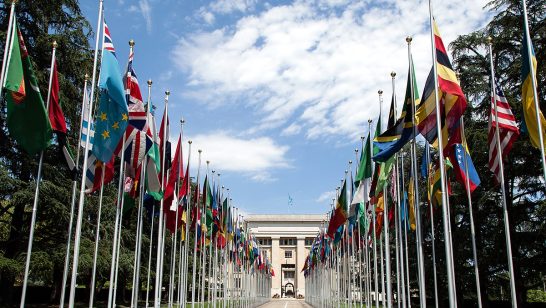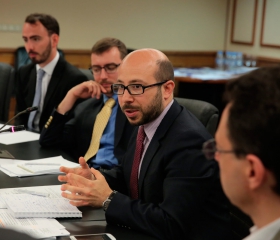
The reset is over – as it should be. It was intended to relaunch the US-Russian relations after six or seven years of the George W. Bush administration and, one can argue, it succeeded. The hallmarks of the reset policy were the general improvement of the atmosphere, the 2010 New START treaty, cooperation on sanctions against the Iranian nuclear program, the supply route through Russia for NATO forces in Afghanistan, Russian abstention during the UN Security Council vote on Libya, as well as a number of other achievements. The relationship revived, but, unfortunately, the reset failed to generate sustained cooperation. In fact, the positive trajectory by and large ended with the last achievement – the UNSC vote on Libya.
At this point it is advisable to recall that US-Russian relations experienced a sort of reset under George W. Bush as well: it started in 2001, when he “looked into the eyes” of Vladimir Putin, and lasted until the war in Iraq in 2003. The positive atmosphere was aided in no small extent by the full support Russia gave the United States after the September 11 terrorist attack. The two parties even concluded a nuclear arms reduction treaty – the 2002 Strategic Offensive Reductions Treaty, which the White House preferred to call the Moscow Treaty and its opponents, SORT (in reference to a joke about a “sort of a treaty”).
The similarity, however, is superfluous. For the George W. Bush administration, relations with Russia were marginal: if Russia refused to go along (as did some of the closest US allies in Europe, incidentally) the bilateral agenda was brushed aside. For Barack Obama and his team, relations with Russia were an important priority: it genuinely sought to improve them and put them on a sustainable track. Russia was (and to some extent is) regarded as an important potential ally on a variety of fronts – from Iran to the global economy.
The symbolic “reset button” Secretary of State Hilary Clinton gave the Russian Foreign Minister Sergey Lavrov during their first meeting featured a curious – and prophetic – mistake: the English word “reset” was translated into Russian as “overload” (peregruzka instead of perezagruzka). Indeed, the agenda was clearly overloaded and, in hindsight, it was not feasible to achieve progress on all fronts.
Looking into the future, most observers of US-Russian relations tend to concentrate on arms control and disarmament – a new treaty to replace New START, missile defense, tactical nuclear weapons and other similar issues. Others pay attention to the human and political rights issues, including first of all the conservative wave that is sweeping through Russia. It is quite sad that nuclear disarmament and political rights dominate the agenda. This only shows that the relationship lacks depth. More than twenty years after the end of the Cold War, trade and investment remain at an extremely low level. They cannot serve as a stabilizer of the relationship (in sharp contrast to Russia’s relations with Europe) and their absence allows other, more volatile and more adversarial issues to top the agenda.
Two features are likely to dominate the future of the US-Russian relationship and both will have a negative effect: domestic politics and the political transition in the Middle East and Northern Africa which is commonly known as the “Arab Spring.”
Contrary to common opinion, there are very few truly difficult issues on the bilateral agenda that cannot be resolved through negotiation. The increasingly conflictual nature of the relationship results from domestic politics in both countries rather than from strategic, economic, or political differences.
A good illustration is the well-known controversy over missile defense. Any decent diplomat could find a solution in a matter of months. Russian concerns concentrate on the fourth – and the last – phase of the American plan (known as the Phased Adaptive Approach), which foresees deployment of systems theoretically capable of intercepting strategic missiles. The solution proposed by Russian military leaders is to limit the capability of the fourth-phase system (for example, through limits on the number of interceptors and the areas of their deployment) so that it does not undermine the existing US-Russian strategic balance while preserving the ability of the American system to intercept a small number of long-range missiles, i.e., to limit the system to its officially proclaimed purpose. In the end, this is about the predictability of the American missile defense capability.
The prospect of reaching agreement, however, is barred by the Republican Party, especially its Tea Party wing, which regards any limits whatsoever as anathema. Missile defense is an article of faith. This is not about plans or capabilities: this is about a deeply ideological commitment to unrestricted unilateralism.
The increasingly tough and vocal (even shrill) Russian rhetoric also stems from domestic politics. Implementation of phase four of PAA is supposed to begin in the end of this decade and it may be another five to seven years, if not longer, until it begins to affect Russian strategic capability. There is plenty of time to negotiate. However, the rhetoric of the Russian government suggests that the threat is imminent. It is safe to assume that is simply the familiar “rally-around-the-flag” tactic of consolidating the public around the government.
Given the dynamic of domestic politics in both countries, efforts of experts to craft a rational agreement appear futile: neither country is interested in serious result-oriented negotiations. The Russian government is more capable of changing the current policy (President Obama is to a much greater extent a hostage of the opposition), but even Vladimir Putin seems to be losing full control of the emotions he has unleashed as the recent flow of anti-American laws adopted by the legislature suggest.
Fundamental differences in the assessment of the “Arab Spring” also contribute to the negative trend in the US-Russian relationship. When looking at Arab states, the West sees oppressive regimes that are doomed and tries to influence the outcome by supporting pro-democracy secular elements of the opposition. An important element in the Western approach is an attempt to minimize human casualties.
Moscow sees Western interference or at least support of opposition forces as misguided, at best. The better informed experts in Moscow no longer see the “Arab Spring” as a Western attempt to establish control over the region under the guise of democratization (the way they perceived the “Rose,” the “Orange” and the other revolutions in the post-Soviet states). Instead, they see major destabilization in the neighborhood and the emergence of Islamist regimes with varying degrees of radicalism.
Today’s events in Syria repeat the pattern that has become standard. Moscow tries to stabilize the situation (whether by limited political support or by calls for a dialogue and managed transition) while the West supports the popular uprising and blames Moscow for not helping. In the meantime, events on the ground develop independently of both.
The list can be continued. The bottom line, however, is already clear. While objectively there is plenty of ground for cooperation – and long-term interests of Russia and the United States are very close, perhaps even coincide in many issue-areas – domestic politics and differences in perceptions prevent such cooperation. Of course, a new Cold War is hardly on the cards: neither side is interested in uncontrolled escalation of tensions and, in all fairness, neither can afford it. But the reset policy has, by and large, failed: its limited success did not translate into broad cooperation, and not for the lack of trying on the part of the Obama administration. It would be futile to hope that dialogue on nuclear disarmament – even in the unlikely case it leads to an agreement (domestic politics will likely prevent serious negotiations from even starting) – will hardly pull bilateral relations out of the deep ravine they reside in at the moment.
The opinions articulated above represent the views of the author(s), and do not necessarily reflect the position of the European Leadership Network or any of its members. The ELN’s aim is to encourage debates that will help develop Europe’s capacity to address the pressing foreign, defence, and security challenges of our time.



